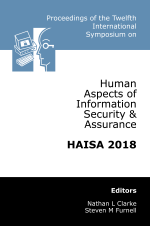In 2014, we launched our open-access repository which offers full text access to conference proceedings from many of our events including the INC and HAISA series. These papers are free to access and distribute (subject to citing the source).
» Openaccess proceedings » Twelfth International Symposium on Human Aspects of Information Security & Assurance (HAISA 2018)
 | Twelfth International Symposium on Human Aspects of Information Security & Assurance (HAISA 2018) |
Title: The BYOD Information Security Challenge for CIOs
Author(s): Alfred Musarurwa, Stephen Flowerday
Reference: pp246-262
Keywords: Bring Your Own Device (BYOD); General Data Protection Regulation (GDPR); Information Security Culture; Information Security Management
Abstract: This paper highlights the way in which Chief Information Officers (CIOs) can mitigate the challenges that are posed by the Bring Your Own Device (BYOD) phenomenon. In terms of this phenomenon, employees inadvertently become unintended administrators as they have control of the devices they use. Previously, information security management was the preserve of the CIO and the Information Technology (IT) department, where trained IT employees managed all devices. Consequently, the advent of BYOD has shifted much of the responsibility from the IT personnel to the organisation’s employees. This paper presents an employee behavioural management approach that CIOs may adopt to mitigate the BYOD information security challenges. This paper addresses the impact of BYOD, on the CIO’s functional, transformational and strategic roles. Subsequently, an employee behavioural intention model is recommended as a way of mitigating these challenges. This BYOD Information Security Behavioural model, which was evaluated through an expert review process with CIOs in the Zimbabwe banking sector, encompasses six constructs: attitude, knowledge, habit, environment, governance and training.
Download count: 789
How to get this paper:


PDF copy of this paper is free to download. You may distribute this copy providing you cite this page as the source.
